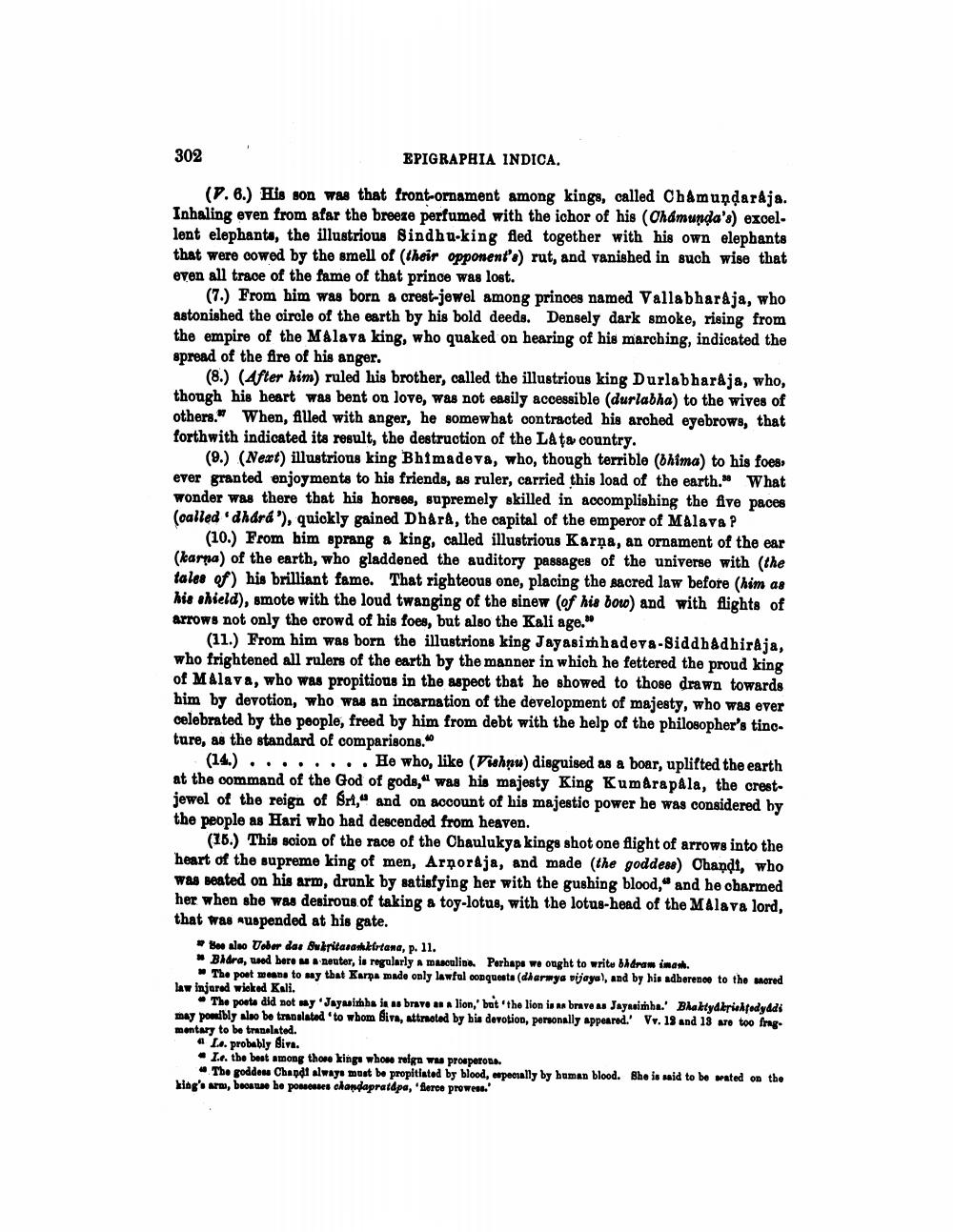________________
302
EPIGRAPHIA INDICA.
(7.6.) His son was that front-ornament among kings, called Chamundardja. Inhaling even from afar the breeze perfumed with the ichor of his (Ohamunda's) excel. lent elephants, the illustrious Sindhu-king fled together with his own elephants that were cowed by the smell of their opponent's) rut, and vanished in such wise that even all trace of the fame of that prince was lost.
(7.) From him was born a crest-jewel among princes named Vallabharaja, who astonished the circle of the earth by his bold deeds. Densely dark smoke, rising from the empire of the Malava king, who quaked on hearing of his marching, indicated the spread of the fire of his anger.
(8.) (4fter him) ruled his brother, called the illustrious king Durlabharaja, who, though his heart was bent on love, was not easily accessible (durlabha) to the wives of others. When, Alled with anger, he somewhat contracted his arched eyebrows, that forthwith indicated its result, the destruction of the Lata country.
(9.) (Next) illustrious king Bhimadeva, who, though terrible (bhima) to his foes ever granted enjoyments to his friends, as ruler, carried this load of the earth. What wonder was there that his horses, supremely skilled in accomplishing the five paces (called .dhdra'), quickly gained Dhara, the capital of the emperor of Malava ?
(10.) From him sprang a king, called illustrious Karņa, an ornament of the ear (karna) of the earth, who gladdened the auditory passages of the universe with the tales of his brilliant fame. That righteous one, placing the sacred law before him as his shield), smote with the loud twanging of the sinew (of his bow) and with flights of arrows not only the crowd of his foes, but also the Kali age."
(11.) From him was born the illustrions king Jayasiṁhadeva-Siddhadhiraja, who frightened all rulers of the earth by the manner in which he fettered the proud king of MAlaya, who was propitious in the aspect that he showed to those drawn towards him by devotion, who was an incarnation of the development of majesty, who was ever celebrated by the people, freed by him from debt with the help of the philosopher's tino. ture, as the standard of comparisons.
(14.) ........ He who, like (Vishnu) disguised as a boar, uplifted the earth at the command of the God of gods," was his majesty King Kumarapala, the crestjewel of the reign of Sri," and on account of his majestic power he was considered by the people as Hari who had descended from heaven.
(16.) This scion of the race of the Chaulukya kings shot one flight of arrows into the heart of the supreme king of men, Arporaja, and made (the goddess) Chandi, who was seated on his arm, drunk by satisfying her with the gushing blood," and he charmed her when she was desirous of taking a toy-lotus, with the lotus-head of the Malava lord, that was suspended at his gate.
Boosloo Dober dar dulritasankirtana, p. 11. Bhdra, wed bere neuter, is regularly A masculine. Perhaps we ought to write bhdraw inash.
The poet weane to my that Karpa made only lawful con questa (dharwya vijayal, and by his adherence to the mored law injared wiokad Kali.
The porta did not wy Jayaiba in se brave an lion, but the lion is a brave us Jayasimha.' Bhaktydkialtodyddi may poolbly also be translated to whom Biva, attrated by his devotion, personally appeared.' Vv. 19 and 13 are too fungo mentary to be translated.
« Le probably Siva. • I.e. the best among those kingo whom rolga wu prosperous.
• The goddess Chapdi alwaye must be propitiated by blood, especially by human blood. She is said to be wated on the King's arm, because be posseokes chandapraidpa, 'flerce prowess."




